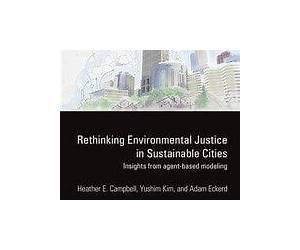Rethinking Environmental Justice in Sustainable citiesrise
Heather Campbell HNZ 1991 Co AuthorFrom the author As the study of environmental policy and justice becomes increasingly significant in today s global climate standard statistical approaches to gathering data have become less helpful at generating new insights and possibilities None of the conventional frameworks easily allow for the empirical modeling of the interactions of all the actors involved or for the emergence of outcomes unintended by the actors The existing frameworks account for the what but not for the why Heather E Campbell Yushim Kim and Adam Eckerd bring an innovative perspective to environmental justice research Their approach adjusts the narrower questions often asked in the study of environmental justice expanding to broader investigations of how and why environmental inequities occur Using agent based modeling ABM they study the interactions and interdependencies among different agents such as firms residents and government institutions Through simulation the authors test underlying assumptions in environmental justice and discover ways to modify existing theories to better explain why environmental injustice occurs Further they use ABM to generate empirically testable hypotheses which they employ to check if their simulated findings are supported in the real world using real data The pioneering research on environmental justice in this text will have effects on the field of environmental policy as a whole For social science and policy researchers this book explores how to employ new and experimental methods of inquiry on challenging social problems and for the field of environmental justice the authors demonstrate how ABM helps illuminate the complex social and policy interactions that lead to both environmental justice and injustice Heather E Campbell
| Rethinking Environmental Justice in Sustainable Cities: Insights from Agent-Based Modeling (Routledge Studies in Public Administration and Environmental Sustainability) By Heather E. Campbell |
| 1135128456 |
| 9781135128456 |
| English |
| 250 |
| Kindle Edition |
| book rethinking environmental justice in sustainable cities book |
| book rethinking environmental justice in sustainable cities and towns |
| book rethinking environmental justice in sustainable cities 2022 |
| Book Rethinking Environmental Justice in Sustainable cities |
| Book Rethinking Environmental Justice in Sustainable cities skylines |
| rethinking environmental justice in sustainable cities book pdf |
| rethinking environmental justice in sustainable cities book review |
| rethinking environmental justice in sustainable cities book summary |
| rethinking environmental justice in sustainable cities book 2 |
| rethinking environmental justice in sustainable cities book 1 |
| Rethinking Environmental Justice in Sustainable Cities book |
| Rethinking Environmental Justice in Sustainable Cities booking |
| Rethinking Environmental Justice in Sustainable Cities booklet |
| Rethinking Environmental Justice in Sustainable Cities booker |
| Rethinking Environmental Justice in Sustainable Cities bookworm |
 .
.